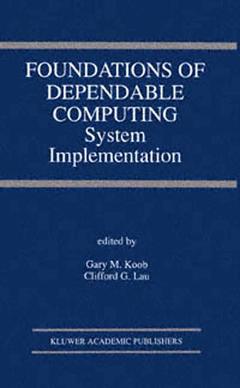Description
Foundations of Dependable Computing, Softcover reprint of the original 1st ed. 1994
System Implementation
The Springer International Series in Engineering and Computer Science Series, Vol. 285
Coordinators: Koob Gary M., Lau Clifford G.
Language: English
Subjects for Foundations of Dependable Computing:
Keywords
Performance; Text; algorithms; distributed systems; management; operating system; processor; router
Publication date: 04-2013
321 p. · 15.5x23.5 cm · Paperback
321 p. · 15.5x23.5 cm · Paperback
Description
/li>Contents
/li>
Foundations of Dependable Computing: System Implementation, explores the system infrastructure needed to support the various paradigms of Paradigms for Dependable Applications. Approaches to implementing support mechanisms and to incorporating additional appropriate levels of fault detection and fault tolerance at the processor, network, and operating system level are presented. A primary concern at these levels is balancing cost and performance against coverage and overall dependability. As these chapters demonstrate, low overhead, practical solutions are attainable and not necessarily incompatible with performance considerations. The section on innovative compiler support, in particular, demonstrates how the benefits of application specificity may be obtained while reducing hardware cost and run-time overhead.
A companion to this volume (published by Kluwer) subtitled Models andFrameworks for Dependable Systems presents two comprehensive frameworks for reasoning about system dependability, thereby establishing a context for understanding the roles played by specific approaches presented in this book's two companion volumes. It then explores the range of models and analysis methods necessary to design, validate and analyze dependable systems.
Another companion to this book (published by Kluwer), subtitled Paradigms for Dependable Applications, presents a variety of specific approaches to achieving dependability at the application level. Driven by the higher level fault models of Models and Frameworks forDependable Systems, and built on the lower level abstractions implemented in a third companion book subtitled System Implementation, these approaches demonstrate how dependability may be tuned to the requirements of an application, the fault environment, and the characteristics of the target platform. Three classes of paradigms are considered: protocol-based paradigms for distributed applications, algorithm-based paradigms for parallel applications, and approaches to exploiting application semantics in embedded real-time control systems.
A companion to this volume (published by Kluwer) subtitled Models andFrameworks for Dependable Systems presents two comprehensive frameworks for reasoning about system dependability, thereby establishing a context for understanding the roles played by specific approaches presented in this book's two companion volumes. It then explores the range of models and analysis methods necessary to design, validate and analyze dependable systems.
Another companion to this book (published by Kluwer), subtitled Paradigms for Dependable Applications, presents a variety of specific approaches to achieving dependability at the application level. Driven by the higher level fault models of Models and Frameworks forDependable Systems, and built on the lower level abstractions implemented in a third companion book subtitled System Implementation, these approaches demonstrate how dependability may be tuned to the requirements of an application, the fault environment, and the characteristics of the target platform. Three classes of paradigms are considered: protocol-based paradigms for distributed applications, algorithm-based paradigms for parallel applications, and approaches to exploiting application semantics in embedded real-time control systems.
Dependable Components.- Self-Checking and Self-Exercising Design for Hierarchic Long-Life Fault-Tolerant Systems.- Design of Self-Checking Processors Using Efficient Berger Check Prediction Logic.- Dependable Communications.- Network Fault Detection and Recovery in the Chaos Router.- Real-Time Fault-Tolerant Communication in Distributed Computing Systems.- Computer Support.- Speculative Execution and Compiler-Assisted Multiple Instruction Recovery.- Compiler Assisted Synthesis of Algorithm-Based Checking in Multiprocessors1.- Operating System Support.- Application Transparent Fault Management in Fault Tolerant Mach.- Constructing Dependable Distributed Systems Using Consul.- Enhancing Fault Tolerance of Real-Time Systems through Time Redundancy.
© 2024 LAVOISIER S.A.S.




